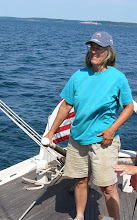Beautiful Ambivalence- The Lake,
Maritime Heritage and Nature
The duality of the lake is clear
in maritime history. This freshwater sea is a life giver and an
entity that takes life with the casual ease that we squash a mosquito
with. The lake kills, it steals our land and washes our houses away,
yet we insist on building cottages and lavish 4000 square foot houses
on the very lip of the land for a thirty year view. This ambivalence,
this paradox runs through much of life and is much on my mind these
days. These truly are the best of
times and the worst of times. A sunset is beautiful, but you're one
day closer to death with the sun's passing. Yet we linger and enjoy. Maybe that's the secret- finding beauty in
these strange and terrible times. The slug comes to mind.
I've been battling them in
the garden lately as I hope to see at least a few beans germinate.
Slugs love just emerged bean plants. Though interesting with their
varied colors and their copious slime it's a stretch to see a lot of
beauty in a slug ( though the slime does dry to a nice silvery color
on the plant leaves.) But have you ever seen a stash of slug eggs?
They're amazing- like tiny translucent crystal pearls. Slime
transformed into something from a fairy tale.
My world just became a bit
more beautiful. We got "Sara B" the schooner out of the barn. Like a
big black butterfly emerging from its cocoon after a long two year
transformation, she will hopefully soon spread her white wings upon
the bay and lake and sail off over the horizon. The homestead feels a
bit empty without her looming presence, but she's about to become a
boat again. It's time. It's time to stop skipping stones and wading
around in the shallows. It's time shove off from the shore and sail
again for a few more short days-


